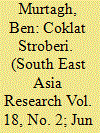| Srl | Item |
| 1 |
ID:
078924


|
|
|
|
|
| Publication |
2007.
|
| Summary/Abstract |
Recent years in Indonesia have seen a marked growth in the number of novels taking lesbian or gay relationships as a key if not central theme. One of the most popular of these novels has been Andrei Aksana's Lelaki Terindah [The Most Beautiful Man], published in Jakarta in 2004. The novel describes a love affair between two Indonesian men, from its first flourishing while the men are on holiday in Bangkok, to its final collapse on their return to familial and societal pressures in Jakarta. In particular, the article considers the very different portrayals of Jakarta and Bangkok from a gay male perspective: while Bangkok is painted as a modern and progressive city, Jakarta is portrayed as restrictive and limiting. In addition, the article considers the ideas of beauty and non-heteronormative sexuality as they are presented in the
|
|
|
|
|
|
|
|
|
|
|
|
|
|
|
|
| 2 |
ID:
097181


|
|
|
|
|
| Publication |
2010.
|
| Summary/Abstract |
This article focuses on the 2007 Indonesian film Coklat Stroberi and its accompanying novel and pop video. The novel by Christian Simamora was based on the film script. The song 'Di sini untukmu' was written especially for the film, in which the band Ungu made a cameo appearance, and the accompanying pop video features numerous scenes from it. While in recent years quite a number of Indonesian films have featured gay characters, this film is notable for the fact that it puts a gay relationship at the very centre of a romantic comedy, and is clearly aimed at a young (17-25) audience. Coklat Stroberi is undoubtedly trying to show same-sex relationships in a progressive light. Nonetheless, the representation of the characters and the film's final outcome highlight an ambivalent attitude towards homosexuality that is common in many Indonesian films. This article pays particular attention to those ambivalences and explores how our understanding of them is enhanced by analysing the transformation of the film into the genres of novel and pop video. Attention is also paid to an apparent mismatch in the filmic imagination of gay characters and the reality of gay lives as they are lived in Indonesia today.
|
|
|
|
|
|
|
|
|
|
|
|
|
|
|
|